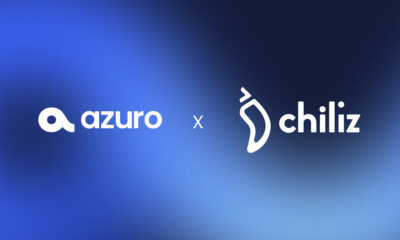BIS
BIS Economists Recommend 3 Crypto Programs for Controllers Worldwide to Follow
Published
1 year agoon
By
admin
Economists at the Bank of International Settlements( BIS) have recommended three programs controllers worldwide could adopt in order to deal with the pitfalls posed by cryptocurrencies. “ Authorities can now consider a variety of policy approaches and at the same time work to ameliorate the financial system in the public interest, ” they advised.
BIS Economists bandy Crypto Policies
The Bank of International Settlements( BIS) published a bulletin last week named “ Addressing the pitfalls in crypto laying out the options. ”
Penned by BIS economists Matteo Aquilina, Jon Frost, and Andreas Schrimpf, the report discusses the pitfalls associated with cryptocurrencies and the colorful options available to controllers and central banks for addressing these pitfalls.
The authors outlined “ three implicit lines of action. ” The first is to “ ban specific crypto conditioning. ” Another option is to “ insulate crypto from tradfi( traditional finance) and real frugality. ” The third is to “ regulate the sector in a manner akin to tradfi. “Still, the report clarifies that the three options aren’t mutually exclusive and could be “ widely combined to alleviate the pitfalls expiring from crypto conditioning. ”
While noting that crypto requests “ have endured a remarkable series of thunderclaps and busts, frequently performing in large losses for investors, ” the BIS economists concluded that “ these failures have so far not revealed over to the traditional fiscal system or the real frugality. ” nevertheless, they advised
There’s no assurance that they won’t do so in the future, as defi( decentralized finance) and tradfi become more integrated.
“ Authorities can now consider a variety of policy approaches and at the same time work to ameliorate the financial system in the public interest, ” the BIS report concludes.
The post BIS Economists Recommend 3 Crypto Programs for Controllers Worldwide to Follow first appeared on BTC Wires.
Source link
You may like


Insight Into The Timing And Factors


Bitcoin About To ‘Blow Higher’ Despite This Week’s Pullback, According to Glassnode Co-Founders – Here’s Why


Azuro and Chiliz Working Together to Boost Adoption of Onchain Sport Prediction Markets – Blockchain News, Opinion, TV and Jobs


Robinhood Bleeds 164 Million Dogecoin


AIGOLD Goes Live, Introducing the First Gold Backed Crypto Project – Blockchain News, Opinion, TV and Jobs


Analyst Benjamin Cowen Warns Ethereum ‘Still Facing Headwinds,’ Says ETH Will Only Go Up if Bitcoin Does This
BIS
Israel, Hong Kong complete retail CBDC test emphasizing privacy, inclusivity
Published
8 months agoon
September 13, 2023By
admin

The Bank for International Settlements and the central banks of Hong Kong and Israel released the results of Project Sela on Sept. 12. The project was a public-private partnership that used private intermediaries to create a retail central bank digital currency (rCBDC) combining the desirable characteristics of cash and the advantages of digitalization.
The project leveraged the central banks’ diverse experience to incorporate a number of predefined policy, security, technology and legal features. The private participants were fintechs FIS and M10 Networks, which provided core products, Clifford Chance for legal analysis and Check Point Software Technologies for cyber security. The project was a proof-of-concept.
Project Sela proposes a new financial infrastructure, the Access Enabler, which facilitates customer-facing activities without ever holding users’ rCBDC. It removes complexity, costs + risks compared w current payment providers #BISInnovationHub @hkmagovhk https://t.co/znVp81gQol pic.twitter.com/hItQamQc0K
— Bank for International Settlements (@BIS_org) September 12, 2023
In the Sela ecosystem, the central bank that issues an rCBDC maintains the ledger for it with pseudo-anonymous end-user accounts and provides instantaneous settlement with a real-time gross settlement (RTGS) system. Funding institutions manage users’ accounts and convert the rCBDC into and out of bank deposits and cash. An intermediary called an access enabler handles all customer-facing services, including Know Your Customer compliance, endorsements and routing, while end users maintain control over their electronic wallets with cryptographic keys.
Related: Hong Kong regulator eyes tokenization for bond market improvement: Report
One advantage of the ecosystem is its accessibility for the private financial institutions that carry out the unbundled financial services, which will purportedly increase competition and lead to increased user access. Access enablers do not create accounts, manage records or control money, reducing the regulatory requirements placed on them:
“Lower entry barriers can enable wider participation in the provision of rCBDC services, compared with the existing payments market, to include, for example, SMEs [small- and medium-sized enterprises], civil society and charitable organisations, e-commerce providers, community centres and technology companies, among others.”
Financial institutions are understood in the traditional sense of banks, credit unions and similar organizations. Thus, it does not lead to disintermediation. Project Sela rCBDC users would not have to be account holders to use the services of those institutions to convert an rCBDC to or from cash. Payments are settled by the central banks, and users control their money the whole time. The central bank participants are assumed to be the operators of the distributed ledger system.
A system weak point noted in the report is RTGS systems, since they are usually not available around the clock and are not designed for frequent small transactions. Potential technical solutions are discussed.
Magazine: Ripple, Visa join HK CBDC pilot, Huobi accusations, GameFi token up 300%: Asia Express
Source link
BIS
Crypto amplified financial risks in emerging markets: BIS papers
Published
9 months agoon
August 22, 2023By
admin

Cryptocurrencies like Bitcoin (BTC) have failed to reduce but rather have “amplified financial risks” in less developed economies, according to a new study published by the The Bank for International Settlements (BIS).
On Aug. 22, the Consultative Group of Directors of Financial Stability (CGDFS) released a new report on cryptocurrencies, titled “Financial stability risks from crypto assets in emerging market economies.”
The study was conducted by BIS member central banks within CGDFS including those in Argentina, Brazil, Canada, Chile, Colombia, Mexico, Peru and the United States. The document emphasized that the views expressed are those of the authors and “not necessarily the views of the BIS.”
According to the authors of the study, cryptocurrencies like Bitcoin hold out the “illusory appeal” of being a quick solution for financial challenges in emerging markets.
“They have been promoted as low-cost payment solutions, as alternatives for accessing the financial system and as substitutes for national currencies in countries with high inflation or high exchange rate volatility,” the study reads. As cryptocurrencies allegedly extended the financial stability risks of emerging markets, authorities have many policy options to address those risks, ranging from outright bans to containment to regulation, the report notes.
At the same time, there are also risks if central banks and regulators react in an “excessively prohibitive manner,” the paper reads, adding that such policies may drive crypto activities into the shadows. The authors added:
“While crypto-related activities have not fulfilled their stated goals to date, the technology could still be applied in various constructive ways. Creating a regulatory framework to channel innovation into such socially useful directions will remain a key challenge in future.”
The central banks mentioned Bitcoin exchange-traded funds (ETFs) as one of major potential market risks in emerging markets as such products are able to lower the barriers to entry for “less sophisticated investors” and increase their exposure.
Among the risks, the study authors mentioned a situation where Bitcoin ETF investors “own no crypto assets but still face large losses when the price of Bitcoin drops.” Additionally, crypto futures-based ETFs “may increase price volatility and amplify risks if they hold a significant portion of the futures market,” the document notes.
Related: Ripple joins BIS cross-border payments task force
It also appears somewhat unclear what emerging markets exactly are implied in the study, as many jurisdictions in this category, including China and Pakistan, have been quite restrictive in terms of crypto regulations. Equally, it’s not clear whether the situation is different for more developed countries.
The BIS did not immediately respond to Cointelegraph’s request for comment.
Though not necessarily expressing views of the BIS, the study is another sign that the authority is cautious about the adoption of cryptocurrencies like Bitcoin. In another report in July, the international financial institution reiterated its high skepticism over crypto, pointing to commonly-cited issues like the instability of stablecoins and the purported irreversibility of smart contracts.
On the other hand, the central bank spoke highly of central bank digital currencies. “By underpinning the future monetary system, CBDCs would be the foundation upon which further innovations are built,” the authority wrote.
Source link

Insight Into The Timing And Factors

Bitcoin About To ‘Blow Higher’ Despite This Week’s Pullback, According to Glassnode Co-Founders – Here’s Why

Azuro and Chiliz Working Together to Boost Adoption of Onchain Sport Prediction Markets – Blockchain News, Opinion, TV and Jobs

Robinhood Bleeds 164 Million Dogecoin

AIGOLD Goes Live, Introducing the First Gold Backed Crypto Project – Blockchain News, Opinion, TV and Jobs

Analyst Benjamin Cowen Warns Ethereum ‘Still Facing Headwinds,’ Says ETH Will Only Go Up if Bitcoin Does This

Tron Price Prediction: TRX Outperforms Bitcoin, Can It Hit $0.132?

Ethereum-Based Altcoin Leads Real-World Assets Sector in Development Activity, According to Santiment

Here’s Why This Analyst Is Predicting A Rise To $360

Hackers With $182,000,000 Stolen From Poloniex Starts Moving Funds to Tornado Cash

Cardano Faces Make-Or-Break Price Level For Bullish Revival

A Premier Crypto Exchange Tailored for Seasoned Traders – Blockchain News, Opinion, TV and Jobs

Crypto Whale Withdraws $75.8 Million in USDC From Coinbase To Invest In Ethereum’s Biggest Presale – Blockchain News, Opinion, TV and Jobs

CFTC Chair Says ‘Another Cycle of Enforcement Actions’ Coming As Crypto Enters New Phase of Asset Appreciation

Spectral Labs Joins Hugging Face’s ESP Program to advance the Onchain x Open-Source AI Community – Blockchain News, Opinion, TV and Jobs

Bitcoin Dropped Below 2017 All-Time-High but Could Sellers be Getting Exhausted? – Blockchain News, Opinion, TV and Jobs

What does the Coinbase Premium Gap Tell us about Investor Activity? – Blockchain News, Opinion, TV and Jobs
BNM DAO Token Airdrop

NFT Sector Keeps Developing – Number of Unique Ethereum NFT Traders Surged 276% in 2022 – Blockchain News, Opinion, TV and Jobs
New Minting Services

Block News Media Live Stream
A String of 200 ‘Sleeping Bitcoins’ From 2010 Worth $4.27 Million Moved on Friday

SEC’s Chairman Gensler Takes Aggressive Stance on Tokens – Blockchain News, Opinion, TV and Jobs

Friends or Enemies? – Blockchain News, Opinion, TV and Jobs

Enjoy frictionless crypto purchases with Apple Pay and Google Pay | by Jim | @blockchain | Jun, 2022

Block News Media Live Stream

How Web3 can prevent Hollywood strikes

Block News Media Live Stream

XRP Explodes With 1,300% Surge In Trading Volume As crypto Exchanges Jump On Board

Block News Media Live Stream
Trending

 Altcoins2 years ago
Altcoins2 years agoBitcoin Dropped Below 2017 All-Time-High but Could Sellers be Getting Exhausted? – Blockchain News, Opinion, TV and Jobs

 Binance2 years ago
Binance2 years agoWhat does the Coinbase Premium Gap Tell us about Investor Activity? – Blockchain News, Opinion, TV and Jobs
- Uncategorized2 years ago
BNM DAO Token Airdrop

 BTC1 year ago
BTC1 year agoNFT Sector Keeps Developing – Number of Unique Ethereum NFT Traders Surged 276% in 2022 – Blockchain News, Opinion, TV and Jobs
- Uncategorized3 years ago
New Minting Services

 Video2 years ago
Video2 years agoBlock News Media Live Stream

 Bitcoin miners2 years ago
Bitcoin miners2 years agoA String of 200 ‘Sleeping Bitcoins’ From 2010 Worth $4.27 Million Moved on Friday

 Bitcoin1 year ago
Bitcoin1 year agoSEC’s Chairman Gensler Takes Aggressive Stance on Tokens – Blockchain News, Opinion, TV and Jobs

